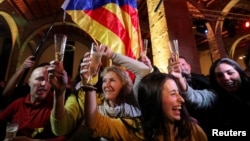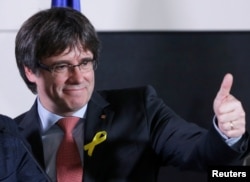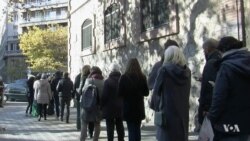Catalan separatists have claimed victory in a crucial snap election Thursday that could decide the future of Spain and its northern province.
With more than 90 percent of the votes counted, the three secessionist parties together had won enough votes for 70 seats in the 135-seat assembly.
But the Citizens party, which wants Catalonia to remain a semiautonomous part of Spain, appeared to be on track to become the biggest single party, with 35 seats in the parliament. As a result, it was unclear who would be given the right to form a government.
The Spanish government called the election after seizing control of the Catalan administration, following a disputed independence referendum in October. Since then, several independence leaders have been jailed or gone into exile. Many have campaigned during the election period via video link.
The leader of the separatist movement, Carles Puigdemont, who is in exile, told a rally in Brussels that "the Spanish state has been defeated.''
The heated independence debate appeared to have brought out voters in big numbers. At one polling station in the central Barcelona district of Eixample, officials told VOA that by lunchtime, the number of voters was roughly double that of the figure in regional elections two years ago.
WATCH: Big Turnout as Catalonia Heads to Polls
Among the voters standing in line in the winter sunshine was Xavier Drudis, a resident of Seattle in the United States. Drudis was back in his home city of Barcelona for the winter holidays just in time to vote. Pinned to his coat was a yellow ribbon, a symbol of solidarity with the jailed independence leaders.
"I believe the society is very divided, so I believe the result is going to be very divided, so I don't think it's going to be a solution. But I also don't think we have to surrender," he told VOA.
Local resident Irma Rio was more optimistic.
"We are happy that we have elections, because the problems with independence and no independence will be solved," Rio said.
Call for 'sanity'
Fernando, a central Barcelona voter who did not share his surname, said the election would not solve the political paralysis.
"We need to approach this problem with sanity. And not with this. Because things will continue, will be the same. There are a lot of people intoxicated with the bad information of nationalists," he said.
The Catalan National Assembly grass-roots campaign group has been at the forefront of organizing the independence protests, and its president, Jordi Sanchez, is in jail on charges of sedition. The vice president, Agusti Alcoberro, told VOA the campaign would go on.
"If there is a clear independence majority, we are going to have to debate whether to work with the government or pressure it to go faster. In case the independence movement does not win, we should rethink the way of acting, but always in a civic, peaceful and democratic way," he said.
David Mejia, a candidate for the pro-unity Ciudadanos party, said the independence campaign was a big distraction.
"I believe that Catalonia is losing time and money talking about the independence process. It is time to put on the table those issues that really matter for Catalan society," he said.
The Spanish government was counting on the 58 percent of voters who didn't take part in the disputed independence referendum to back pro-unity parties. Meanwhile, independence campaigners thought Madrid's tough crackdown had won them more support.








